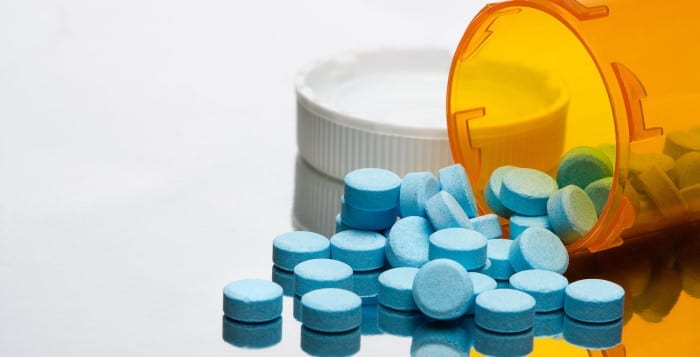Jeff Reynolds recently attended a funeral in Huntington for a young woman, a heroin addict who had gotten clean but died of an overdose after a relapse. Reynolds, the executive director of the Long Island Council on Alcoholism and Drug Dependence, said two weeks later, the young woman’s boyfriend also died from an overdose.
Drug use has become more and more of a problem on Long Island in recent years. According to a special grand jury report from the Suffolk County District Attorney’s office, there were 231 overdose deaths from controlled substances in Suffolk County last year.
Opioid painkillers accounted for 75 percent of them.
But an initiative to combat opioid overdoses — from drugs like heroin, Vicodin and Percocet — is already showing promise, just days after it was launched. Suffolk County Police Department’s Michael Alfieri, an officer in the 7th Precinct, responded to a call of an overdose in Mastic Beach last week. According to the police, Alfieri found a 27-year-old man unresponsive and not breathing, and revived him by intranasally administering Naloxone, an opioid blocker known by its brand name, Narcan. The officer also gave the man oxygen before he was transported to the hospital. That overdose victim survived.
Officers Thomas Speciale and David Ferrara revived a woman in Lake Ronkonkoma who had overdosed on heroin on Aug. 5. The 4th Precinct officers responded to a 911 call at 1:20 pm and found the 21-year-old woman in a parked car, unresponsive and barely breathing, police said. Speciale administered Narcan and Ferrara provided additional medical care before the woman was transported to the hospital for treatment.
The New York State Department of Health piloted a program that allows those in certain counties, including Suffolk, with basic life support training, such as volunteer emergency medical technicians, to administer Narcan. Previously, it was limited to those with advanced life support training.
Legislator Kara Hahn (D-Setauket) sponsored a bill, which the county Legislature adopted, that expanded this to include officers in the Suffolk County Police Department, many of whom have basic life support training. A police spokesperson said it is being piloted in the 4th, 6th and 7th Precincts and the Marine Bureau, and 267 officers have already been trained to administer the intranasal medicine.
“Our officers are first on the scene in virtually all medical emergencies,” Dr. Scott Coyne, SCPD’s chief surgeon and medical director, said in a phone interview. He said it is important that officers have resources like Narcan to treat people because “it’s really during those first critical minutes that they mean the difference between life and death, particularly in overdose situations.”
Last Monday was the first day the officers were on the street with Narcan, according to the police department. Alfieri saved the man who overdosed two days later, and Speciale and Ferrara saved the Lake Ronkonkoma woman on Sunday.
“There was one less mother grieving for her child,” Hahn said in a phone interview after the first incident. She expressed her hope that the program would save more lives in the future.
Reynolds said Narcan works by quickly surrounding opiate receptors, blocking the drug’s ability to access the brain. “The person will experience some withdrawal but the overdose will come to an immediate end.”
Other benefits of the medicine are that it’s inexpensive and there aren’t any negative consequences if it is administered to someone who has not overdosed on opioids, Reynolds said. Signs of an overdose include blue nail beds, blue lips, unconsciousness and the inability to remain upright.
Dr. Coyne said, “Undoubtedly this pilot program will be a great benefit to the citizens of the county and particularly it’s going to result in, I believe, many lifesaving events.” Dispatchers are receiving more and more calls about drug overdoses, he said, adding that 60 police cars now carry Narcan.
Other states have had success with similar programs. According to The Boston Globe, Narcan reversed more than 1,000 opioid overdoses in 12 Massachusetts cities between 2007 and 2011 through a pilot program that allowed substance abuse treatment centers to train people how to use the overdose antidote.
Dr. Coyne said the SCPD precincts piloting the Narcan program were selected because they appeared to have more overdoses. The Marine Bureau was chosen because it serves Fire Island, and the time it takes to transport someone to a hospital could be longer than in other places.
Dr. Coyne and Hahn both said they would like to see the local program expanded and Reynolds said Narcan “should be in every police car,” and even school nurses and parents of addicts should carry it.
For friends and family of those addicted to opioids, LICADD trains people to identify an overdose and administer Narcan through an injection into the leg — different from the police department’s aspirator — and sends trainees home with two vials of Narcan and two syringes.
Reynolds said the best way to prevent an overdose is to not use drugs in the first place, but that Narcan is an important measure in helping those struggling with addiction survive long enough to receive help.
He said Narcan “gives these kids a second shot.”





